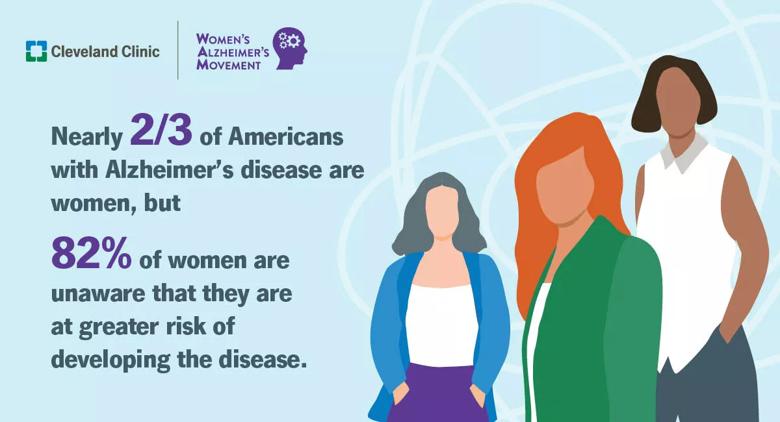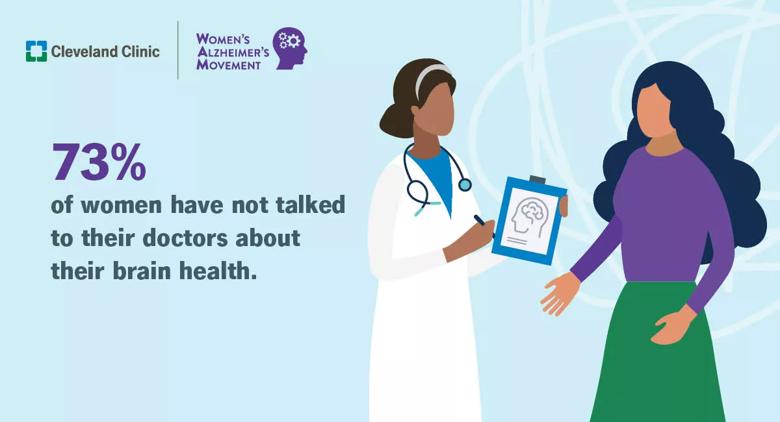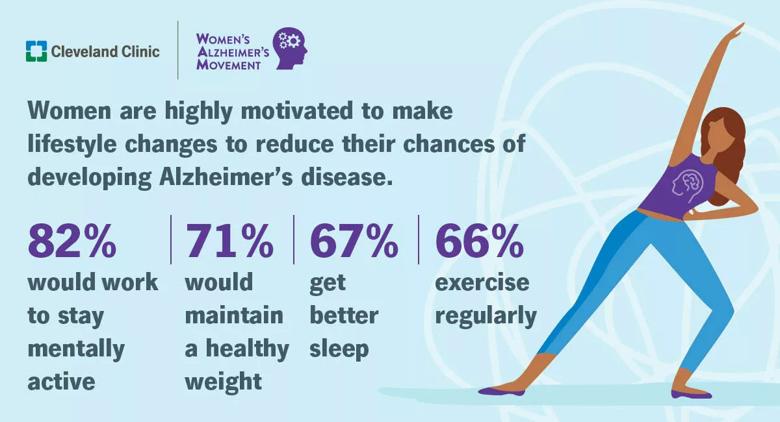82% of women do not know that they are at increased risk for Alzheimer’s disease, though two-thirds of cases are women

Today, the Women’s Alzheimer’s Movement (WAM) at Cleveland Clinic released the results of a comprehensive survey on the state of women’s health, revealing that American women are largely unaware of crucial and pressing health issues that can impact their lives and long-term health.
Some of the more startling facts include that 82% of women do not know they are at increased risk for Alzheimer’s disease, though two-thirds of cases are women. Also, the majority of women have not spoken with their healthcare providers about several critical areas of health that can put them at risk for the disease.

Image content: This image is available to view online.
View image online (https://assets.clevelandclinic.org/transform/4d49392a-41d5-44cc-b621-1d4551cdd3a2/22-CCC-3056884-WAM-Survey-for-Aspen-Health-1-1200x650-1_jpg)
An alarming 73% of women have not discussed their cognitive health with providers, and 62% of women have not discussed menopause or perimenopause — transitional phases in a woman’s reproductive life — that research now shows are critical to monitor closely in order to reduce the risk for Alzheimer’s.
The findings will be presented by Maria Shriver, founder of WAM, and strategic partner for women’s health and Alzheimer’s at Cleveland Clinic, and Beri Ridgeway, M.D., Cleveland Clinic’s chief of staff, at the Aspen Ideas: Health Festival on Friday, June 24, and give a glimpse into the status of women’s health in the U.S. and factors that contribute to the growing instances of Alzheimer’s disease.
The good news is that a majority of women (71%) in the survey said they had seen a doctor in the past year, with 58% of women ranking their health as generally good. At the same time, 56% report not getting enough sleep, 35% say they almost always or often wake up in physical pain, and two in five women have been diagnosed with or treated for anxiety, depression and insomnia.
“The fact that women experience high levels of depression, anxiety and insomnia, but report being unaware that these are often symptoms of menopause means women may be going to the doctor, but not necessarily having the right conversations,” said Shriver. “The survey results are both a red flag about the state of women’s health, but also an exciting opportunity to redirect the way that both healthcare providers and women think, talk and act on issues involving women’s health—at every age and every stage of a woman’s health span. Women want the information and it’s incumbent on us all to get it to them.”

Image content: This image is available to view online.
View image online (https://assets.clevelandclinic.org/transform/3bceec9f-8f7c-4461-b416-57cacb9fad2d/22-CCC-3056884-WAM-Survey-for-Aspen-Health-2-1200x650-1_jpg)
Of the women who reported their physical health as being poor, 32% cited chronic conditions as the cause. Among those who categorized their mental health as poor, most cited depression (33%) and anxiety (30%) as the issue. Low physical activity, chronic conditions like diabetes, obesity and hypertension, and depression are all associated with increased risk for Alzheimer’s disease. Only 12% of women in this survey reported knowing about a possible link between estrogen loss and an increased risk for Alzheimer’s, a major area of interest and research funded by WAM at Cleveland Clinic.
Over half of the women surveyed report caring for others, with 43% of them saying they focus on other people’s health over their own. Single mothers report the lowest quality of sleep and the highest percentage when it comes to women rating their health as poor or fair (69%.)
These numbers are important to the study of women’s health, since many of the health factors affecting women can be adjusted if women are made aware of this empowering health information. Science now suggests that 40% of Alzheimer’s disease cases could be prevented through healthy lifestyle modifications like diet and exercise.
One positive survey finding revealed that when educated on lifestyle factors, women are highly motivated to prioritize them to reduce their risk:

Image content: This image is available to view online.
View image online (https://assets.clevelandclinic.org/transform/c0352919-061e-48f0-b011-d0f62c226a33/22-CCC-3056884-WAM-Survey-for-Aspen-Health-4-1200x650-1_jpg)
“We know that women’s unique biology and experiences over the course of their lifetime do play a role in Alzheimer’s disease, and this survey illustrates the need to inform women of this link and empower them to start having conversations with their providers now so they can prioritize their brain health and improve overall health outcomes,” said Dr. Ridgeway. “Cleveland Clinic officially partnered with WAM in February to do that through research, education and advocacy. This is another reminder of the importance of our work together as WAM at Cleveland Clinic.”
About Cleveland Clinic
Cleveland Clinic is a nonprofit multispecialty academic medical center that integrates clinical and hospital care with research and education. Located in Cleveland, Ohio, it was founded in 1921 by four renowned physicians with a vision of providing outstanding patient care based upon the principles of cooperation, compassion and innovation. Cleveland Clinic has pioneered many medical breakthroughs, including coronary artery bypass surgery and the first face transplant in the United States. U.S. News & World Report consistently names Cleveland Clinic as one of the nation’s best hospitals in its annual “America’s Best Hospitals” survey. Among Cleveland Clinic’s 72,500 employees worldwide are more than 5,050 salaried physicians and researchers, and 17,800 registered nurses and advanced practice providers, representing 140 medical specialties and subspecialties. Cleveland Clinic is a 6,500-bed health system that includes a 173-acre main campus near downtown Cleveland, 22 hospitals, more than 220 outpatient facilities, including locations in northeast Ohio; southeast Florida; Las Vegas, Nevada; Toronto, Canada; Abu Dhabi, UAE; and London, England. In 2021, there were 10.2 million total outpatient visits, 304,000 hospital admissions and observations, and 259,000 surgical cases throughout Cleveland Clinic’s health system. Patients came for treatment from every state and 185 countries. Visit us at clevelandclinic.org. Follow us at twitter.com/ClevelandClinic. News and resources available at newsroom.clevelandclinic.org.
About Women’s Alzheimer’s Movement at Cleveland Clinic
The Women’s Alzheimer’s Movement at Cleveland Clinic is a partnership between the Women’s Alzheimer’s Movement (WAM), the pre-eminent non-profit organization for women and Alzheimer’s founded by Maria Shriver, and Cleveland Clinic, a nonprofit multispecialty academic center that integrates clinical care with research and education. The venture between these two renowned organizations is focused on raising awareness about women’s increased risk for Alzheimer’s and other neurological diseases, educating the public about brain health, and raising funds to support women-based Alzheimer’s and neurological research. WAM has led the way in re-framing the narrative of Alzheimer’s as a women’s issue, starting with its ground-breaking 2010 Shriver Report: A Woman’s Nation Takes on Alzheimer’s, published in partnership with the Alzheimer’s Association. Since then, Shriver and WAM have continued to help shape the national dialogue and policy around Alzheimer’s, including leading the first ever California Task Force on Alzheimer’s Prevention, Preparedness and the Path Forward in 2021. To learn more visit thewomensalzheimersmovement.org or follow @womensalzmovement and @womenalz
Editor’s Note: Cleveland Clinic News Service is available to provide broadcast-quality interviews and roll upon request.